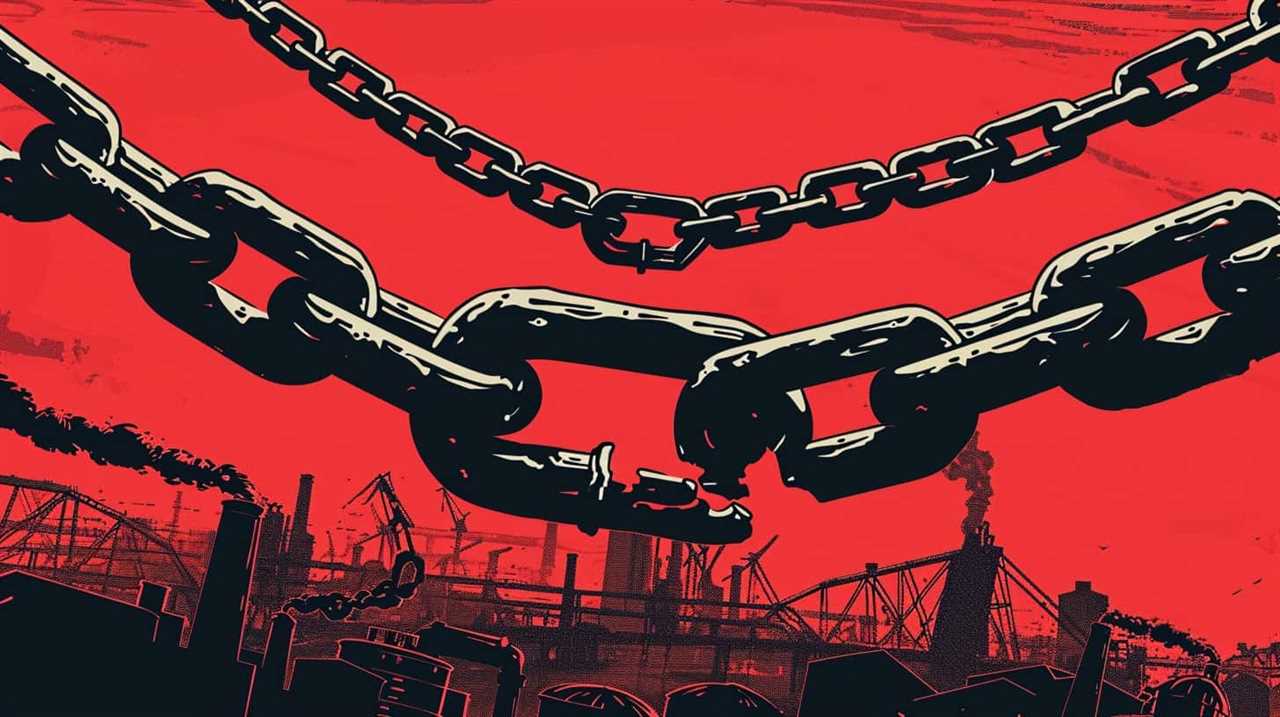Ladies and gentlemen, I welcome you to explore the effects of neoliberalism on the global economy. Like a powerful gust of wind changing the shape of a wheat field, this influential ideology has greatly impacted our economic landscape.
In this concise journey, we will uncover eight key ways in which neoliberalism has altered the way economies function. From the deregulation and free trade that have opened up new avenues for innovation, to the privatization of public services that has sparked entrepreneurial spirits, we will delve into the intricate web of neoliberal policies.
Prepare to witness the rise of global interconnectedness, the impact of income inequality, and the influence of corporate power. Together, let us uncover the transformative power of neoliberalism on the world stage.
Key Takeaways
- Deregulation and free trade have led to increased competition and market efficiency, as well as the expansion of international trade and integration of markets.
- The privatization of public services has resulted in greater efficiency and cost-effectiveness, but also raised concerns about accountability and unequal access to essential services.
- Financialization and speculation have contributed to economic instability and risk, concentration of wealth, and widening inequality, highlighting the need for critical examination of its role in the economy.
- The neoliberal policies of deregulation and unchecked risk-taking by financial institutions have led to economic instability, widening income and wealth gaps, and undermined social cohesion and consumer resilience.
Deregulation and Free Trade
Deregulation and free trade have transformed various industries and markets worldwide. The dismantling of regulations and the push towards trade liberalization have been key components of the neoliberal economic agenda.

These policies have aimed to remove barriers and restrictions on businesses, allowing for greater competition and market efficiency.
By dismantling regulations, governments have sought to reduce bureaucratic hurdles that hindered business growth and innovation. This has led to increased flexibility and adaptability within industries, allowing companies to respond more quickly to changing market conditions. Additionally, the removal of regulations has encouraged entrepreneurship and the entry of new players into the market, fostering innovation and driving economic growth.
Trade liberalization, on the other hand, has focused on reducing tariffs, quotas, and other trade barriers between countries. This has resulted in the expansion of international trade and the integration of markets on a global scale. As a result, businesses have gained access to larger customer bases and a wider range of suppliers, leading to increased competition and specialization.
The deregulation and free trade policies haven’t been without their critics. Some argue that these policies have led to the concentration of wealth and power in the hands of a few, while others point to the negative environmental and social impacts of unregulated markets.

However, it’s undeniable that these policies have played a significant role in reshaping the global economy and fostering innovation.
Privatization of Public Services
One significant aspect of neoliberalism’s impact on the global economy is the privatization of public services. Under neoliberal policies, there’s been a trend towards transferring the ownership and control of public services from the government to private corporations. This shift has had both positive and negative effects on service quality and corporate control.
Increased Efficiency: Proponents argue that privatizing public services allows for greater efficiency and cost-effectiveness. Private corporations are driven by profit motives, which can incentivize them to streamline operations and improve service delivery.
Lack of Accountability: However, privatization can also lead to a loss of accountability. Private corporations may prioritize profit over the public interest, potentially resulting in reduced service quality or neglect of underserved communities.

Unequal Access: Another concern is the potential for unequal access to essential services. Privatization may exclude marginalized groups who can’t afford the cost of private services, exacerbating existing inequalities.
Financialization and Speculation
Financialization and speculation, two key aspects of neoliberalism, have had significant impacts on the global economy. One consequence is increased economic instability and risk, as financial markets have become more volatile and prone to crises.
Additionally, financialization has contributed to the concentration of wealth and widening inequality, as speculative activities often benefit a small group of wealthy individuals or institutions at the expense of the broader population.
These effects highlight the need for a critical examination of the role of financialization and speculation in shaping our economic system.

Economic Instability and Risk
How has neoliberalism contributed to the increase in economic instability and risk?
Neoliberalism, with its emphasis on deregulation and free markets, has played a significant role in exacerbating economic volatility and systemic risk. Here are three key ways in which neoliberal policies have contributed to this instability:
- Financialization: Neoliberalism has promoted the expansion of financial markets and the prioritization of profit-driven financial activities. This has led to the emergence of complex financial products and excessive speculation, increasing the potential for market crashes and economic downturns.
- Deregulation: Neoliberal ideology advocates for reduced government intervention and oversight in the economy. While this has allowed for more market freedom, it has also created a regulatory void that can lead to unchecked risk-taking by financial institutions, as seen in the 2008 global financial crisis.
- Inequality: Neoliberal policies often prioritize the interests of the wealthy and corporations, leading to widening income and wealth gaps. This inequality not only undermines social cohesion but also creates economic instability, as it limits the purchasing power and resilience of the majority of consumers.
Wealth Concentration and Inequality
Neoliberal policies have contributed to the concentration of wealth and the exacerbation of inequality through the expansion of financialization and speculation. Financialization refers to the increasing role of financial markets, instruments, and institutions in the economy, while speculation involves the buying and selling of assets with the expectation of making quick profits.
These processes have allowed the wealthy to accumulate vast amounts of wealth, while leaving the majority of the population struggling to keep up. Wealth redistribution and social mobility, which are crucial for a fair and inclusive society, have been hindered by neoliberal policies that prioritize the interests of the wealthy and corporations.

As a result, income inequality has soared and social mobility has declined, making it increasingly difficult for individuals to move up the economic ladder. This concentration of wealth and inequality will be further explored in the subsequent section on the reduction of government intervention.
Reduction of Government Intervention
One of the key effects of neoliberalism on the global economy has been the significant reduction in government intervention. This shift towards economic liberalism has had a profound impact on the way nations operate and interact in the global marketplace.
Here are three key aspects of this reduction in government intervention:
- Deregulation: Neoliberalism promotes the removal of regulations and barriers that restrict market forces. This has led to the relaxation of rules in various sectors, such as finance, telecommunications, and transportation. The aim is to encourage competition and innovation, allowing market forces to determine prices and allocate resources efficiently.
- Privatization: Governments have increasingly turned to privatization, transferring the ownership and control of state-owned enterprises to the private sector. This has led to the expansion of private companies in industries such as utilities, healthcare, and transportation. Proponents argue that privatization increases efficiency and productivity through market competition.
- Trade liberalization: Neoliberal policies have also focused on reducing trade barriers, such as tariffs and quotas, through international agreements like the World Trade Organization. This has facilitated the growth of global trade and the integration of economies, enabling businesses to access larger markets and consumers to benefit from a wider range of goods and services.
These changes in government intervention have paved the way for the subsequent phenomenon of globalization and outsourcing.

Globalization and Outsourcing
Globalization and outsourcing have been key components of neoliberalism, reshaping the global economy in significant ways.
By promoting economic interdependence, outsourcing has allowed businesses to take advantage of lower costs and access to new markets.
However, this has also had a profound impact on local industries, as jobs and production have been shifted overseas, leading to concerns about unemployment and the erosion of domestic manufacturing capabilities.
The rise of globalization and outsourcing highlights the complex trade-offs and challenges brought about by neoliberal policies.

Economic Interdependence Through Outsourcing
Through outsourcing, we’ve become economically interdependent with other countries. This phenomenon has transformed global supply chains and has had a significant impact on the global economy. Here are three key points to consider:
- Increased economic inequality: While outsourcing has led to economic growth and increased efficiency, it has also contributed to rising economic inequality. Developed countries often outsource labor-intensive tasks to developing countries with lower labor costs, leading to job losses and wage stagnation in the home country.
- Global supply chains: Outsourcing has resulted in the emergence of complex global supply chains. Companies now rely on multiple suppliers and partners across different countries, creating a network of interconnectedness. This interdependence has made it crucial for countries to maintain stability and cooperate in order to ensure the smooth functioning of the global economy.
- Innovation and competition: Outsourcing has fueled innovation and competition by allowing companies to access specialized expertise and resources from around the world. This has led to the development and adoption of new technologies, boosting productivity and economic growth. However, it has also intensified competition among countries and industries, requiring continuous innovation to stay competitive.
Impact on Local Industries
With the rise of neoliberalism, our local industries have been profoundly impacted by globalization and outsourcing. The increased interconnectedness of economies has led to the outsourcing of jobs to countries with lower labor costs, resulting in significant changes in the job market. While this has allowed for cost savings and increased profits for businesses, it has also led to job losses and insecurity for workers in our local communities.
The impact on the job market has been particularly felt in industries that require low-skilled labor, as these jobs are more easily outsourced. Moreover, the effects on local communities extend beyond job losses, as they face the challenge of adapting to the changing economic landscape.
As we delve further into the topic of neoliberalism, it’s important to consider its implications on income inequality and poverty.

Income Inequality and Poverty
While neoliberalism has had a significant impact on the global economy, it has also exacerbated income inequality and poverty. The implementation of neoliberal policies, such as deregulation and privatization, has resulted in a concentration of wealth and power in the hands of a few, leaving the majority of the population struggling to make ends meet.
Here are three key ways in which neoliberalism has contributed to income inequality and poverty:
- Weakening of labor unions: Neoliberal policies have undermined the collective bargaining power of workers, leading to a decline in wages and job security. With weakened labor unions, workers have less leverage to negotiate for fair wages and working conditions, further widening the income gap.
- Lack of social safety nets: Neoliberalism emphasizes individual responsibility and limited government intervention. As a result, social safety nets, such as unemployment benefits and welfare programs, have been scaled back or dismantled. This leaves vulnerable populations without adequate support, increasing their risk of falling into poverty.
- Financialization of the economy: Neoliberal policies have prioritized the financial sector, resulting in increased speculation and risk-taking. This has led to economic volatility and crises, disproportionately affecting those with lower incomes who lack the resources to weather such shocks.
Addressing income inequality and poverty requires a holistic approach that includes policies aimed at redistributing wealth, strengthening social safety nets, and promoting inclusive economic growth. By reevaluating the impact of neoliberalism and implementing innovative solutions, we can strive towards a more equitable and prosperous future.
Austerity Measures and Fiscal Policy
Neoliberalism reshaped the global economy by implementing austerity measures and shaping fiscal policy. Austerity measures, characterized by fiscal discipline and government spending cuts, became a prominent tool in the neoliberal agenda. Proponents argued that reducing government expenditure and debt would lead to economic growth and stability. However, the impact of these measures has been highly debated.

One of the main ways in which neoliberalism implemented austerity measures was through structural adjustment programs imposed by international financial institutions such as the International Monetary Fund and the World Bank. These programs often required recipient countries to adopt strict fiscal policies, including reducing public spending on social welfare programs and public services.
Critics argue that austerity measures have had negative consequences, particularly for the most vulnerable members of society. Government spending cuts often result in reduced access to essential services such as healthcare and education, leading to increased inequality and social unrest.
Moreover, austerity measures have been criticized for their potential to exacerbate economic downturns. By reducing government spending during times of economic recession, the demand for goods and services can decrease further, prolonging the downturn.
As we delve into the subsequent section about the rise of corporate power and influence, it becomes evident that the implementation of austerity measures and the shaping of fiscal policy had significant implications for the global economy.

How Does Marxian Economics Compare to Neoliberalism in Shaping the Global Economy?
Marxian economics and neoliberalism have contrasting impacts on the global economy. While neoliberalism emphasizes free market capitalism, Marxian economics focuses on the effects of Marxian economics on labor, exploitation, and inequality. The two ideologies shape economic policies differently, leading to varying outcomes for wealth distribution and societal structures.
Rise of Corporate Power and Influence
The implementation of austerity measures and shaping of fiscal policy have paved the way for the rise of corporate power and influence in the global economy. As global capitalism continues to evolve, corporations have gained significant control over economic policies and decision-making processes, shaping the direction in which economies develop.
Here are three ways in which corporate influence has been on the rise:
- Lobbying and Political Contributions: Corporations have increasingly invested in lobbying efforts and political contributions to influence government policies and regulations in their favor. This allows them to shape the legal and regulatory framework to maximize their profits and maintain their dominance in the market.
- International Trade Agreements: With the proliferation of free trade agreements, corporations have gained the ability to expand their operations globally and exert influence over national governments. These agreements often prioritize the interests of multinational corporations, granting them special privileges and protections that can undermine local industries and workers’ rights.
- Corporate Capture of Regulatory Agencies: Regulatory agencies, tasked with safeguarding the public interest, are susceptible to corporate capture. This occurs when corporations exert undue influence over these agencies, leading to weakened regulations and inadequate oversight. As a result, corporate interests are prioritized over public welfare, potentially leading to environmental degradation, labor exploitation, and financial instability.
The rise of corporate power and influence in the global economy has profound implications for innovation, competition, and societal well-being. It’s crucial to critically examine and address the challenges posed by corporate influence to ensure a fair and sustainable global economic system.
Frequently Asked Questions
How Does Neoliberalism Affect the Environment and Natural Resources?
Neoliberalism’s impact on the environment and natural resources includes environmental degradation and increased resource extraction. These consequences stem from market-oriented policies that prioritize economic growth, often at the expense of sustainability and long-term ecological well-being.

What Role Does Neoliberalism Play in Shaping Education Systems?
Privatization of education and marketization of knowledge are key ways neoliberalism shapes education systems. These processes prioritize profit and competition, leading to increased inequality, commodification of education, and a focus on measurable outcomes rather than holistic learning.
How Does Neoliberalism Impact Social Welfare Programs and Access to Healthcare?
Neoliberalism’s impact on social welfare programs and access to healthcare has been significant. It has led to the privatization of public services, resulting in limited resources for poverty alleviation and unequal access to healthcare.
What Are the Consequences of Neoliberal Policies on Developing Countries?
Neoliberal policies in developing countries have resulted in economic inequality and increased foreign investment. As a result, these nations have experienced both positive and negative consequences, shaping their economic landscape and creating unique challenges.
How Does Neoliberalism Influence Labor Rights and Worker Protections?
Neoliberalism has had a significant impact on labor rights and worker protections. It has led to increased worker exploitation and income inequality, as it prioritizes the interests of corporations and reduces government regulation.

Conclusion
In conclusion, it’s evident that neoliberalism has significantly reshaped the global economy in numerous ways.
From the deregulation and free trade policies to the privatization of public services, these changes have had far-reaching effects.
Financialization and speculation, along with the reduction of government intervention, have also played a role in shaping the global economic landscape.
Additionally, globalization and outsourcing, income inequality and poverty, austerity measures, and the rise of corporate power have all contributed to the transformation of the global economy.

Lauren’s talent in writing is matched by her passion for storytelling. Her love for books and deep understanding of culture and entertainment add a distinct flavor to her work. As our media and press contact, Lauren skillfully bridges the gap between afterQuotes and the broader media landscape, bringing our message to a wider audience.










